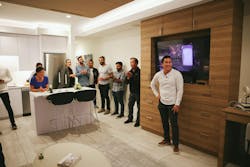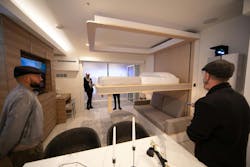Modular, Modern Apartment Prototype ‘Cloud S’ Unveiled
It’s here! Cloud Apartments—a technology company creating a new brand of modern, modular apartments—unveiled its first prototype, the "Cloud S."
The Cloud S (for "studio") is a 450-square-foot modern apartment with a twist: It’s built like a product. Through modular construction, founder and CEO Curtis Wong wants to mass-produce and sell these standardized apartment units “like a Tesla.”
The balance Wong must strike is developing something that can be mass-produced, upscaled, and affordable to build and buy. What does it take to make a modern apartment? Smart tech!
WHAT IS A MODERN APARTMENT?
For Cloud Apartments, these modular, modern units come equipped with smart controls—lighting, entertainment, heating/cooling—sleek design finishes, and most importantly, built-in affordability.
Wong is aware, though, that the term "smart home" has had negative connotations in the industry in the past. Why? The Cloud developer chalks it up to bad user experience design—issues that largely come from using wireless (rather than wired) technology to try and power a smart home.
Cloud Apartments circumvents these issues through a centralized touch-screen panel. The smart panel, along with many of the smart devices in the unit, are fully wired. This means that Cloud S nixes the occasional bugs of wireless connectivity, leaving the essential user experience in-tact.
What all can be controlled in this smart and modern apartment? Currently, the resident can expect to control window blinds, lighting, music through the integrated built-in-the-ceiling sound-system, projections on the wall, the bed, entertainment system, and even a Roomba.
The beauty in Cloud’s design is an elevated home for renters, sold like a product, and is affordable from being mass-produced. In fact, Wong anticipates they could produce up to 10,000 units (or more) per year.
“No one else is truly standardizing like us,” says Wong. “You buy a ‘Cloud S’—it’s a product that is always the same wherever you rent.”
The 450-square-foot unit is sound-proofed, handicap-accessible, and fully up to California code, according to Wong. But the Cloud S is just the start. The company is planning on developing a Cloud 1 and Cloud 2 (one- and two-bedroom, respectively) to join the line-up.
Where Cloud Apartments stands at the moment, though, is a “wildly successful” launch event with dozens of industry players eager to see more.
THE ‘CLOUD S’ SMART APARTMENT UNVEILING EVENT
Over 60 attendees from 30+ companies attended the unveiling of the Cloud S earlier this month. Developers, contractors, factory-representatives, and industry professionals alike were “extremely excited,” according to Wong. “It's great to see the industry come out and support this type of innovation.”
Cloud is fielding interest from almost every corner of the industry—student housing, condos, multifamily, and even backyard ADUs (which the company is now considering for development as well).
Wong expressed his continued interest in the productization of the Cloud Apartments lineup, and what that means for marketing.
“I’ve never seen an apartment marketed in the way we will, like a luxury car,” he says. “The closest thing are multi-million dollar penthouse condos, but nothing like the sort of apartment we're demonstrating that is actually obtainable to normal people.”
Wong, alongside veteran modular builder Matthew Rapa, aims to have each unit “95% complete” before putting them together at a development. Cloud’s patented snapping system allows for all of the unit’s plumbing, electrical, smart tech, and finish work to be set in place for connectivity on-site.
“The goal is to be able to connect these apartments together as rapidly as a NASCAR pit crew," says Wong, citing that contractors currently have a difficult time pricing modular projects, resulting in overly high modular costs.
What Cloud Apartments’ potential becomes, then, is a solution to the rising shortage of talent and labor in the construction industry. With its plug-and-play modular approach to construction, there are significant savings in both cost and time to build, according to the company.
“Costs are so high for housing because of labor shortages, rates to pay for labor, and efficiencies that aren’t improving,” says Wong. “How do you be more efficient with your labor? Modular makes the most sense to me.”
So far, the company has found that building with this system has provided a 30% savings in cost per housing unit. Inevitably, Wong wants to show the potential that modular building has for affordability without compromise.
For now, the startup company is setting out to partner with leading factories and contractors across the country. Cloud Apartments encourages smart and sustainable builders to connect with them and build using its patented technology.
To learn more about Cloud Apartments and its innovative modular approach, read our previous article here.
For more on offsite construction and startups, read it here on Utopia.



